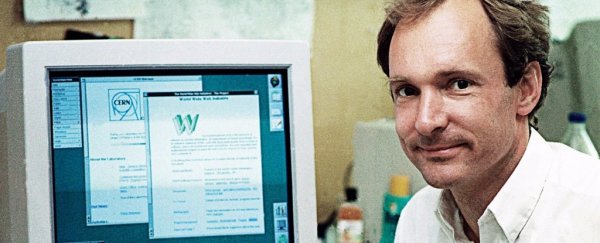Losing control of our personal data. The spread of fake news. The lack of regulation around political advertising. These are three of the biggest threats facing the Web today, according to its inventor, Tim Berners-Lee.
On March 12, 1989, the computer scientist submitted a proposal to CERN for what would become the World Wide Web.
To mark its 28th birthday, Berners-Lee - now founding director of the World Wide Web Foundation - has written an open letter discussing three issues he is "increasingly worried about", and believes "we must tackle in order for the Web to fulfil its true potential as a tool which serves of all humanity".
The full letter is worth a read, but in short, the trends are:
Fake news
Large numbers of people are growing increasingly concerned about the spread of misinformation online - from fake news being cynically peddled to make a quick buck off advertising to sophisticated political propaganda campaigns.
Social networks "show us content they think we'll click on - meaning that misinformation, or 'fake news', which is surprising, shocking, or designed to appeal to our biases can spread like wildfire", Berners-Lee wrote.
"And through the use of data science and armies of bots, those with bad intentions can game the system to spread misinformation for financial or political gain."
Losing control of personal data
People are surrendering their personal data when they sign up to sites, and this has got Berners-Lee worried.
"As our data is then held in proprietary silos, out of sight to us, we lose out on the benefits we could realise if we had direct control over this data, and chose when and with whom to share it," he said.
"What's more, we often do not have any way of feeding back to companies what data we'd rather not share - especially with third parties - the T&Cs are all or nothing."
The risks are multiplied in countries with authoritarian regimes, where collaboration between companies and governments can put citizens' lives at risk.
Political advertising
The father of the Web argues that sophisticated modern advertising is putting democracy at risk.
"There are suggestions that some political adverts - in the US and around the world - are being used in unethical ways - to point voters to fake news sites, for instance, or to keep others away from the polls."
"Targeted advertising allows a campaign to say completely different, possibly conflicting things to different groups. Is that democratic?"
There's a common thread running through all three of these trends: The power of huge tech companies like Facebook and Google, and how, unchecked, they can have corrosive effects on our civil society.
There's no simple solution to all the problems.
Berners-Lee suggests everything from encouraging companies to explore subscriptions and micropayments rather than advertising, to ensuring we have "more algorithmic transparency to understand how important decisions that affect our lives are being made, and perhaps a set of common principles to be followed".
"It has taken all of us to build the Web we have," he concludes, "and now it is up to all of us to build the Web we want - for everyone."
You can read Tim Berners-Lee's full letter over on the website of the World Wide Web Foundation.
This article was originally published by Business Insider.
More from Business Insider:
